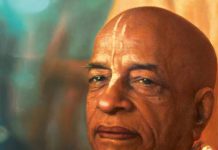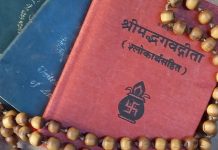Pradyumna prabhu had a lengthy meeting with Srila Prabhupada this afternoon to finalize his reply to the Blitz article on Sai Baba. Pradyumna read from the opening paragraph of the article which was entitled "God is an Indian." "'His contemporary avatara rests in the trinity of Sirti Baba, Sai Baba, and Prem Baba to come. So Satya Sai Baba, the second of the triple incarnation, asserted in the course of a marathon interview to add, 'In my present avatara, I have come armed with the fullness of the power of the formless God to save humanity.'"
Srila Prabhupada dictated the outline of the letter to Pradyumna. "'Dear Sai Baba, just recently in the Blitz paper, published on — give the date — we were surprised to find one article "God is an Indian." And you have claimed to become an incarnation of God to save the human society. What is the ground of your claiming as incarnation? And what you have done to save the human society? Will you explain for enlightenment of us, or many of us. We have got the list of incarnations recorded in the Vedic scriptures and their respective activities also. So where is that record in the Vedic scripture about your appearing as incarnation? Lord Krsna's incarnation-ness is fully described in Srimad-Bhagavatam. Similarly, Lord Ramacandra's incarnation-ness or Lord Buddha's incarnation-ness, Lord Caitanya's incarnation-ness, we have got full information in Vedic literatures. Where is your incarnation described? Will you kindly give the reference? Anyone can say like you, that one is incarnation, as it has become a fashion nowadays. But is that claim the only proof of one's becoming incarnation? Some such unauthorized claim of becoming an incarnation is certainly ridiculous. Then you have claimed to take form.' What he has written?"
Pradyumna re-read Baba's claim to being an avatara "armed with the fullness of the power of the formless God."
Prabhupada continued. "'So you have claimed to take a form of the formless God. But we see in the Bhagavad-gita that God is never formless.'" He had Pradyumna read out verse 7:24 from the Gita, and its purport. Telling Pradyumna to quote the verse in the letter, along with a quote from Yamunacarya found in the purport, Prabhupada went on with his dictation: "'Only the rascals and less intelligent class of men think that God is formless and when He incarnates, He takes a particular form…. So in this connection, the statement of Bhagavatam is especially important. Brahmeti paramatmeti bhagavan iti sabdyate. Brahman is impersonal, Paramatma is localized, and Bhagavan is the Supreme Personality of Godhead.'"
Voicing aloud Prabhupada's statement as he wrote it down, Pradyumna repeated, "Brahman is the impersonal…"
Prabhupada immediately corrected him. "'Brahman is impersonal.' Not the. 'Paramatma is localized, and Bhagavan is the Supreme Personality of Godhead.'"
Citing many verses from Bhagavad-gita, Prabhupada made the point that Krsna's personality cannot be understood without His mercy. "'So one has to accept the statement of Krsna, the Supreme Personality of Godhead, how He is originally the purusa or person,'" he said. "'Impersonal Brahman is expansion of the rays of His personal body, exactly like the sunshine is expansion of the rays of the sun-god Vivasvan. Vivasvan is a person in the sun globe and Krsna is also a person who spoke the philosophy of Bhagavad-gita long, long years before He spoke the same to Arjuna. Imam vivasvate yogam proktavan aham avyayam. Therefore, the conclusion is that originally God is always a person. Impersonal Brahman is emanation from the personal God. In other words, God, personal God, is not from impersonal Brahman; but impersonal Brahman is from the personal God. That is confirmed in the Bhagavad-gita. Impersonal Brahman is resting on the personal God, exactly that illumination of light is resting on the electric bulb, not that the bulb is resting on the illuminated light.'"
Again quoting from the Gita Prabhupada came to a very pointed conclusion: " 'So Krsna, as a person, says to Arjuna that both of them existed in the past as person, and they'll continue to remain person in the future. So without knowing all this knowledge, a mudha accepts the incarnation of God as coming from imperson, avajananti mam mudha manusim tanum asritam. Under this heading you have proved yourself to become a mudha. And how a mudha or an ass can become the incarnation of God?'"
Not content with that, Prabhupada asked Pradyumna to read the rest of the article to him.
Pradyumna squinted through his glasses at the paper and read out a declaration by the writer of his acceptance of what he called "the avatara concept which broadly means the descent of the divine principle into human affairs." Reminding the reader of Lord Krsna's descent to save humanity, the writer declared: "Solution and cure to world's ills: To Baba's devotees, the avatara has similarly come to provide both the solution and the cure to a world living in terror of a nuclear holocaust. The false dichotomies created by Western thought between God and man, purusa and deva, simply do not exist in the Indian scriptures, which prescribe the assimilation of God in man and man in God as the basis of religion."
Prabhupada was disgusted. "This is another rascaldom. God is always distinct from man."










